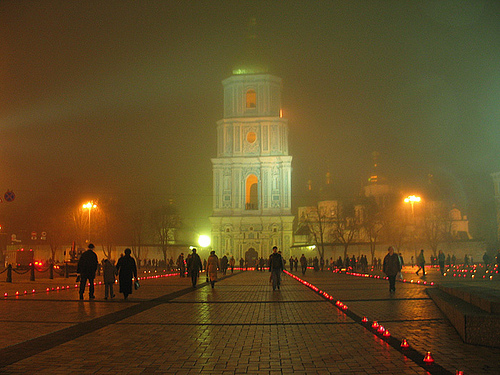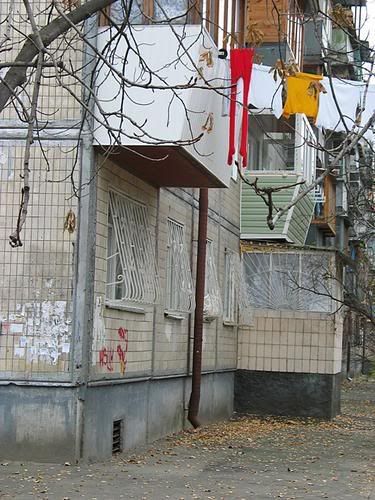I really hoped Saakashvili would let them protest all they wanted, but he's an impatient guy, unfortunately, and so he
ended up using some force today to get them out.
I haven't been following the situation in Georgia too closely, but
BBC tells me "the protesters accuse President Saakashvili of corruption and of not doing enough to tackle poverty" - and I've no reasons not to believe them.
***
Here's what I wrote about Georgia four years ago:
Farewell to Shevardnadzeby Veronica Khokhlova
November 2003
Euro-Correspondent.com
It's getting seriously cold here in St. Petersburg, and I am desperately trying to fight off the urge to hibernate. The past few weeks have been a success, for all the wrong reasons. Stuck so relatively close to the North Pole, I've been watching the news from all those blessed, warm localities - Israel, Iraq and Turkey: every single day, so much shock and pain, so much bloodshed.
Saturday afternoon, another eruption, this time in Tbilisi, Georgia. At first, I cried. I just couldn't imagine that what I was seeing live on BBC and CNN could possibly disturb the current destructive pattern. Tbilisi wasn't new to violence, after all.
But within an hour or so, my pessimism was gone. The crowd was so united, and the roses were so not like guns, and the way in which Shevardnadze was ushered out of the parliament building was so pathetic, and the opposition leaders were so confident and astute. I feared something could still go wrong later - but it also looked like it most definitely wouldn't.
It all went smoothly and I'm so happy now. I'm so proud of the Georgian people. And I keep thinking of two minor episodes that to some extent seem to explain to me, a dilettante, what this "velvet revolution" might have been about.
One of my dear friends used to work in Tbilisi several years ago. In December 2000, she came to spend a few days in Kyiv before flying to the States for the holidays. We were at the airport to meet her and, as we moved away from the gate, still hugging and kissing and helping her with the luggage, we didn't notice how something dropped out of her backpack. Someone called after us - and my friend gasped and rushed back so speedily as if it was her wallet, or something as precious, lying there on the floor. It was a flashlight, an ordinary flashlight. "Oh, you don't understand," she told us with some abandon. "It's my most valuable possession, the most indispensable thing I own now." This is how I learned about the never-ending power shortages in Georgia.
Two years later, in October 2002, I was in a cab in Moscow, on my way to the Kremlin Cup finals. The driver was Georgian, and since he seemed interested, I decided to share some of the tournament's highlights with him. One was Russia's ex-president Boris Yeltsin, of course, who had spent over six hours cheering for a succession of this country's players on a previous day. No matter what one's political views might be, Yeltsin the Tennis Fan could be very amusing, even cute. The Georgian cab driver had a slightly different take on it. He shook his head in disbelief and fired out a curse in Russian so powerful and wordy that I think I blushed. Then he elaborated: "And look at our old fart, Shevardnadze! That's what he should be doing - retire and spend the rest of his life watching tennis! And instead, he is stealing and stealing and stealing, till nothing remains of the country!"
Shevardnadze has been ousted, beautifully. I now hope that besides political satisfaction, the Georgians will have heat and light restored in their homes. I also hope that there'll emerge enough new opportunities for the exiles like this cab driver and his family to return to their homeland.










